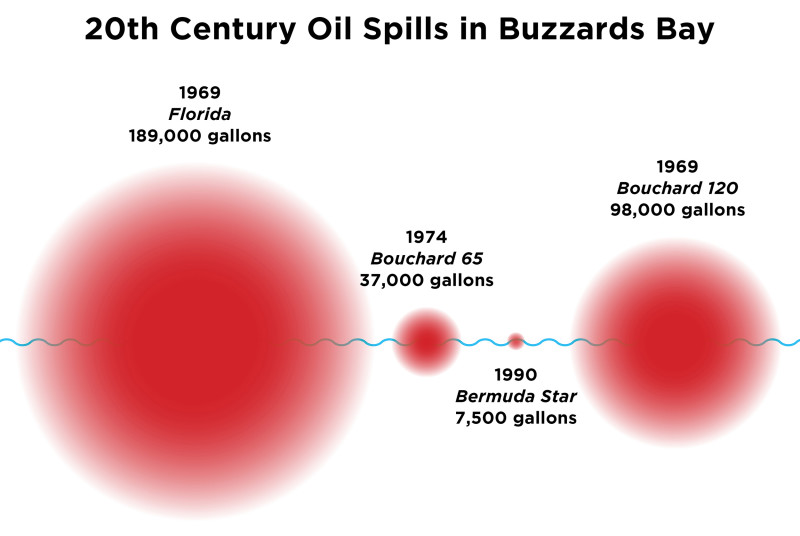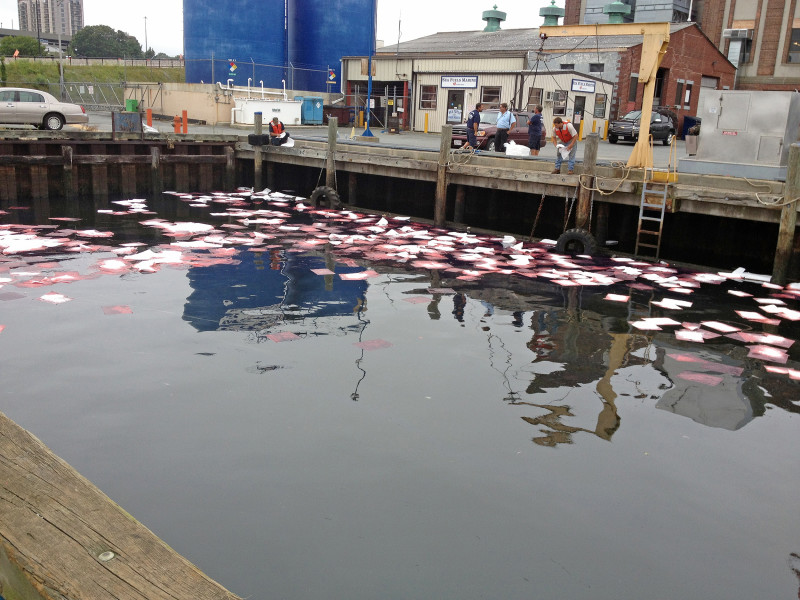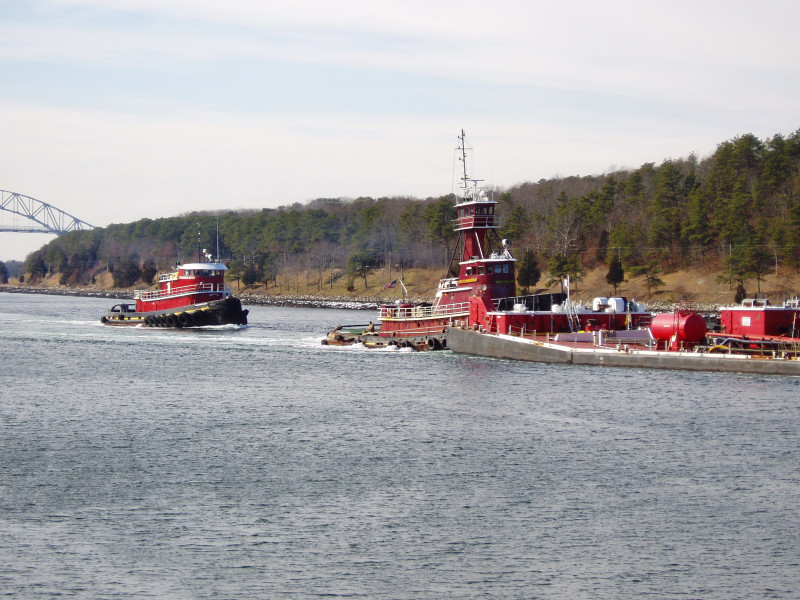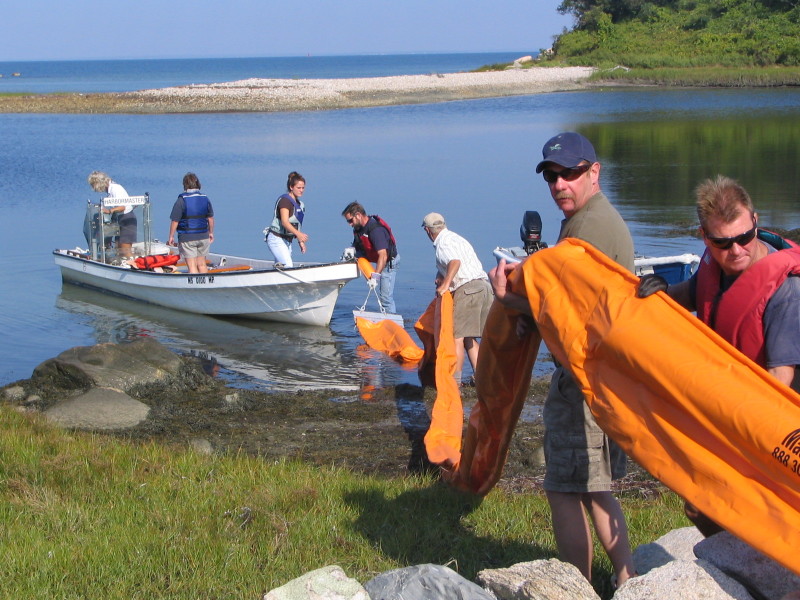For those who lived on Buzzards Bay during the Bouchard B-120 oil spill, memories of that day are still vivid. The Buzzards Bay Coalition developed new laws that make the Bay safer from oil today than it was 10 years ago. But oil spills remain a constant threat. That’s why the Coalition continues to advocate for the strongest possible protections for Buzzards Bay.
Why are oil spills a threat to Buzzards Bay?
Buzzards Bay is in constant danger of oil spills, both large and small. Barges carrying oil through the Bay have caused major spills in the past, and continue to pose a threat. But other vessels can be a source of small oil spills that can add up to a big problem.
Oil transport through Buzzards Bay
Each year, more than 2 billion gallons of oil pass through Buzzards Bay. The Bay is a major transport route for barges carrying oil and gasoline through Cape Cod Canal to Boston and northern New England.

In the past 50 years, there have been four major oil spills in Buzzards Bay from barges carrying oil through the Bay.
Buzzards Bay is a tricky waterway for these barges to navigate. There are many rocky reefs and ledges, and vessels can run aground if they’re not familiar with our waters. Because of these challenges and the sheer volume of oil traveling through here, the Bay is in constant danger of a major oil spill.
The most recent major oil spill happened in 2003. On the afternoon of Sunday, April 27, a tank barge operated by the Bouchard Transportation Company passed on the wrong side of a navigational marker south of Westport. It struck underwater rocks, which gouged a 12-foot hole in the hull.
In total, 98,000 gallons of heavy #6 fuel oil spilled into Buzzards Bay. Oil washed up along 93 miles of coastline, clinging to rocks and marsh grasses. Hundreds of seabirds died, and beaches and shellfish beds were closed for months. Beautiful places like Barneys Joy in Dartmouth, West Island in Fairhaven, and Ram Island in Mattapoisett were some of the hardest-hit areas.
This wasn’t the first major oil spill in Buzzards Bay; in the past 50 years, there have been four. And unfortunately, these may not be the last.
“Mystery” oil spills in New Bedford Harbor

First responders use oil-absorbent pads to clean up a small “mystery” oil spill in New Bedford Harbor.
Large spills aren’t the only oil threat that Buzzards Bay faces. In New Bedford Harbor, small oil spills cause local pollution problems.
Since 2010, the Coast Guard has recorded at least one spill in New Bedford Harbor every month. In 2011 alone, 22 separate fuel spills were reported. For more than half of these cases, no responsible party was ever identified, earning them the label “mystery spills.”
These spills are small – most are only about 5 gallons of oil. But mystery oil spills are a chronic problem in New Bedford Harbor, which already suffers from legacy toxic pollution. A likely source of many “mystery spills” is contaminated bilge water. Vessels often release their bilge into the harbor, unaware that oil and fuel have leaked into it.
The Coalition helped develop a successful pilot program called Clean Bilge, which provides free bilge pumpout service to fishing vessels in Fairhaven and New Bedford. But to truly stop mystery oil spills, the Port of New Bedford needs a permanent bilge collection service on the waterfront.
What’s being done to protect Buzzards Bay from oil spills?
The only way to eliminate the devastating impacts of oil spills is to prevent them from happening at all. The Coalition has taken the lead to protect Buzzards Bay from future spills and help communities better respond to spills that do happen. Our advocacy and response efforts have led to a safer Bay.
Massachusetts Oil Spill Prevention Act (MOSPA)
In the wake of the Bouchard B-120 oil spill, the Coalition led a successful campaign to secure one of the strictest oil spill prevention laws in the country.
The Massachusetts Oil Spill Prevention Act (MOSPA) requires that all vessels carrying oil through Buzzards Bay have a tug escorting them. It also includes navigational routes and minimum personnel on barges. The Coalition drafted MOSPA, which was passed unanimously by the Massachusetts state legislature and signed into law in August 2004.

Escort tugs, like the one shown here, can assist if problems happen when transporting oil through Buzzards Bay.
Today, Buzzards Bay is safer from the threat of oil spills than it was in 2003. A 24/7 vessel tracking system monitors all oil barge traffic in the Bay. Experienced local pilots and trained escort tugs guide barges through the Bay’s dangerous channel. Since MOSPA was passed, there has not been another major oil spill.
It’s clear that MOSPA is working to protect Buzzards Bay from oil spills. But the U.S. Coast Guard has made multiple attempts to weaken this legislation – particularly the escort tug protections. In 2005, the Coast Guard sued Massachusetts, claiming that the state doesn’t have the right to pass a law protecting Buzzards Bay. Then they issued weakened navigational rules, which were eventually thrown out in court. Most recently, the Coast Guard and the oil transport industry asked the U.S. District Court in 2014 to reopen its case challenging MOSPA. They later withdrew the request, but this fight will likely never be over.
An escort tug with a local pilot is the most important protection against oil spills in Buzzards Bay. Vessels carrying oil rely on escort tugs when problems happen. It’s a common-sense protection that keeps our Bay safe.
The Coalition will continue to defend MOSPA and maintain the strongest possible protections against oil spills. We can’t let Buzzards Bay be at risk of another major oil spill.
Oil spill response planning and training

First responders across Buzzards Bay have taken part in oil spill drills, like this one on Naushon Island. Each town has an oil spill response trailer with a boom and other equipment to contain spills.
When oil spills do happen, a quick response is critical. Each Buzzards Bay community owns an oil spill response trailer, which contains booms and other equipment to contain spills. In the event of an oil spill, fire departments and harbormasters work together across town lines to ensure a rapid response.
After the Bouchard B-120 spill, the Coalition worked with local municipalities, the Massachusetts Dept. of Environmental Protection, and the Coast Guard to create a Geographic Response Plan for oil spills in Buzzards Bay. This plan details specific strategies to contain oil in 43 different waterways, from the Westport Rivers all the way to Cuttyhunk West End Pond.
In the event of a major oil spill, the Coalition is also the Massachusetts designated volunteer coordinator for Buzzards Bay. It’s an integral role we filled in 2003, when thousands of local residents wanted to help clean up the Bay’s shores – but a role we hope we never have to fill again.